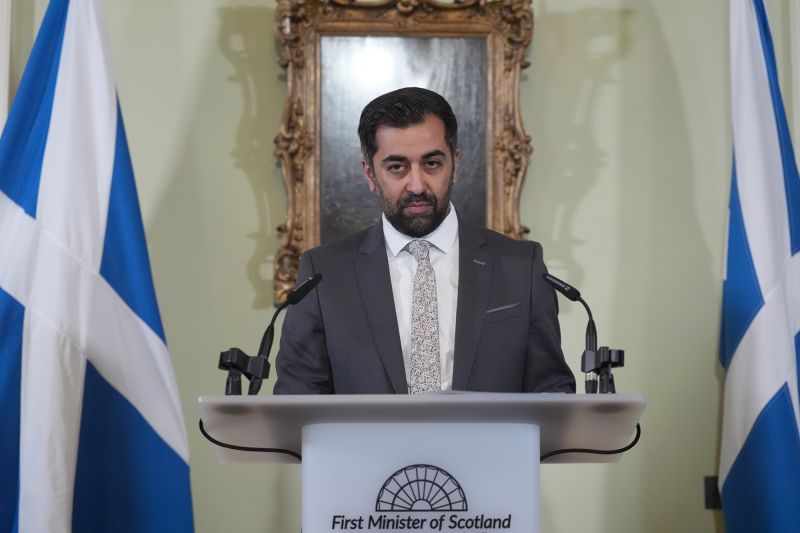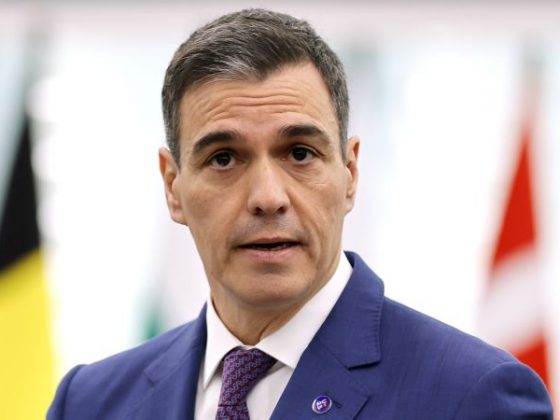Scottish First Minister Humza Yousaf has resigned barely a year into the role after the collapse of his coalition government, a humbling and chaotic departure that throws Scotland’s ruling pro-independence party into chaos.
Yousaf’s coalition government fell apart unexpectedly last week when he tore up a coalition agreement with Green Party lawmakers, a risky move that backfired spectacularly when the Greens said they would vote against him in a confidence motion.
The ruling SNP will now hold a leadership candidate to replace Yousaf, he announced in a news conference on Monday.
Yousaf took over as the leader of the Scottish National Party (SNP) party last March, hoping to extend the party’s domination of politics north of the border into a third decade and strengthen the case for a new referendum on Scottish independence.
But the party’s ever-worsening legal woes and a tumultuous coalition agreement put his leadership on brittle footing, and an unforced error to throw two Green lawmakers out of his government sent Yousaf into a five-day fight for his job.
“Unfortunately, in ending the Bute House Agreement in the manner I did, I clearly underestimated the level of hurt and upset that caused Green colleagues,” he admitted in his news conference.
“For a minority government to be able to govern effectively trust when working with the opposition is clearly fundamental,” he said.
The left-leaning SNP has led Scotland’s devolved government since 2007, and forced an independence vote in 2014 in which Scottish voters opted to remain part of the United Kingdom.
Yousaf has argued for another vote to be held in the coming years, insisting that Britain’s exit from the European Union – which Scots had voted against – changed the calculus.
But his calls have been batted back in Westminster and undermined by a long-running police investigation into financial irregularities by the SNP, which has eroded its public support.
The SNP will now look to elect a replacement to lead Yousaf’s government, but they are two seats short of a majority in Holyrood, Scotland’s seat of power, meaning any potential leader would have to win over opposition lawmakers in order to govern effectively.
Should the opposition unite to stonewall a new appointment, Scotland could ultimately face the prospect of going to the polls in a snap election. Opinion polls suggest the SNP would face a two-way battle with the resurgent and pro-union Labour party for control of parliament, having lost a chunk of its support since the last vote in 2021.
But the SNP will hope to avoid that possibility by finding a leader who can command enough support from opposition parties. Yousaf said Monday he would stay on until a new leader is chosen.
The SNP’s descent into disorder has nonetheless mired a remarkable, 17-year run of supremacy in Scotland, dimming the prospect of the bloc achieving its holy grail: quitting the union with England, Wales and Northern Ireland and striking out alone as an independent country.
A historic but brief tenure
In an emotional speech on Monday, Yousaf said it had been an “honor” to lead the SNP in government. But his time in power was rocky and his short tenure has harmed his party’s standing even further after a brutal year for the group.
Yousaf took over from the commanding former SNP leader Nicola Sturgeon last year, becoming the first non-White head of the Scottish government. On his victory he pointed to his own background – born in Glasgow, with a father from Pakistan and mother from Kenya – and views as examples of the progressive and multi-ethnic Scotland that the SNP has promoted.
Sturgeon had abruptly announced her resignation after a nine-year stint, and soon after was arrested then released without charge as police probed the party’s finances, causing a political headache for Yousaf early in his role.
Nonetheless, he never enjoyed the levels of popularity with voters that Sturgeon once did, and frequently found himself caught between the liberal tendencies of his Green allies and parts of his party on one side, and the more socially conservative members of the SNP on the other.
An especially controversial expansion of Scotland’s hate crime legislation, which expanded protections for transgender people, was hailed by LGBTQ+ groups but attacked by critics as a move that would stifle free speech.
Ultimately, Yousaf’s decision to drop key 2030 climate targets angered the Greens, prompting him to tear up the so-called Bute Agreement between the parties and instead try rule as a minority government. In response, the Greens pulled their support for him altogether, meaning a narrow majority of the Scottish Parliament was positioned against him.
Scotland had pitched itself as a global climate leader by setting a goal of slashing carbon emissions by 75% by 2030, from 1990 levels — one of the most ambitious targets in the world. But Yousaf’s government was forced to admit earlier this month that the nation was off track in meeting the goal and scrapped the target outright.
Yousaf said that the goal, which was set before he came into office, was “beyond what we are able to achieve.”


